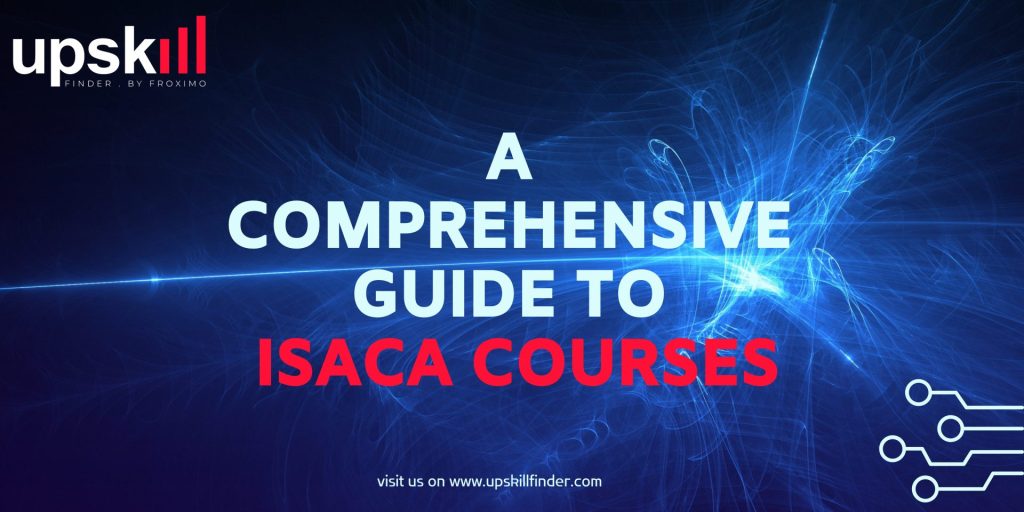ISACA Course: Tips For Success 2023
Introduction:
ISACA (Information Systems Audit and Control Association) is a globally recognized organization that provides certifications and professional development opportunities for individuals in information security, IT governance, risk management, and assurance. ISACA courses certifications, including CISA (Certified Information Systems Auditor), CISM (Certified Information Security Manager), CRISC (Certified in Risk and Information Systems Control), and CGEIT (Certified in the Governance of Enterprise IT), are highly valued by employers and demonstrate a high level of expertise in their respective domains. This blog will delve into ISACA course guidelines, exam structures, and valuable tips to succeed in these prestigious certifications.
ISACA Courses Certification :
ISACA courses offers a range of certification that cater to different professional roles and career paths. Here are the four prominent certifications offered by ISACA:
1. Certified Information Systems Auditor (CISA):
- Focus: IT auditing, control, and security.
- Suitable for professionals working in auditing, risk management, and IT security domains.
2. Certified Information Security Manager (CISM):
- Focus: Information security governance, risk management, and incident response.
- Suitable for professionals involved in designing and managing an enterprise’s information security program.
3. Certified in Risk and Information Systems Control (CRISC):
- Focus: IT risk management and control, aligning IT with business objectives.
- Suitable for IT professionals and risk management practitioners.
4. Certified in the Governance of Enterprise IT (CGEIT):
- Focus: IT governance and strategic alignment of IT with business goals.
- Suitable for individuals responsible for managing IT governance and ensuring IT investments yield value.
Exam Structure:
ISACA certification exams follow a standardized structure across all certifications. Understanding the exam pattern is crucial for effective preparation:
1.Number of Questions: The number of questions varies for each certification, generally ranging from 100 to 150.
2.Question Format: The questions are typically in multiple-choice format, with four options, and there may also be some scenario-based questions.
3.Exam Duration: The exam duration is generally four hours.
4.Pass Mark: The pass mark for ISACA exams is usually set at 450 out of 800.
Tips for Success:
Successfully passing an ISACA certification exam requires dedication, preparation, and a strategic approach. Here are some valuable tips to increase your chances of success:
- Understand the Exam Content: Thoroughly review the official exam content outline provided by ISACA. Understand the domains and topics covered in the exam and focus your preparation accordingly.
- Create a Study Plan: Develop a well-structured study plan based on the time available before the exam. Allocate sufficient time for each domain, and prioritize areas where you feel you need more confidence.
- Use Official Resources: Utilize official ISACA study materials, practice questions, and sample exams. These resources are designed to align with the exam content and will give you a clear idea of the question format and difficulty level.
- Hands-on Experience: Combine theoretical knowledge with practical experience. Real-world experience in the relevant domain will reinforce your understanding and make it easier to relate to exam scenarios.
- Join Study Groups: Join online forums or local study groups where you can discuss concepts, share experiences, and get valuable tips from others preparing for the same certification.
- Practice Time Management: During the exam, manage your time wisely. Refrain from getting stuck on challenging questions; move on and return to them later if time permits.
- Simulate Exam Conditions: Take practice exams under timed conditions to simulate the exam environment. This will help build your endurance and familiarity with the time pressure.
- Review and Revise: Leave ample time for revision before the exam. Focus on weak areas and ensure you understand the underlying concepts.
Conclusion:
ISACA courses are widely respected and can open doors to rewarding career opportunities in IT governance, risk management, security, and auditing. By following the ISACA course guidelines, understanding the exam structure, and implementing the tips provided, you can boost your chances of success and demonstrate your expertise in the respective field. Preparation and dedication are key to achieving your desired ISACA certification and advancing your professional career. Good luck!


